//Soft:Doc iii 軟紀錄片影研會側記
超剪:語言之後
Supercut: After Languages
2022.11
// 講者|主持人—林欣怡 國立陽明交通大學應用藝術研究所副教授
// 放映導演—阮純詩
// 放映影片|每天都是七〇年代(2018,15分鐘)、十一個男人(2016,28分鐘)
// 文字紀錄整理:陽交大應藝所碩生柯祖皓 // 英文翻譯|陽交大應藝所碩生林玟君
// 時間:2022/11/1(二)14:30—17:30
面對電影,面對影像,我們是在旁白(言說)中進行意義的生成(固定的、情性的)、
並且看不見影像蒙太奇之間的鬥爭所形成未明的朦朧感知,僅將影像視為言語意義來理解?
或者以在影片中尋找哲學觀點圖䆁的態度進行觀影?
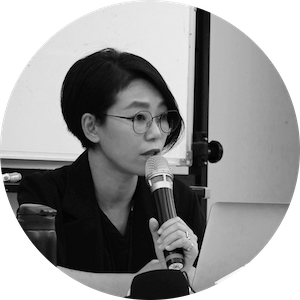
林欣怡 Hsin-I, LIN
// Speaker/Moderator | Prof. Hsin-I, LIN (NYCU, IAA)
// Director | Nguyễn Trinh Thi (Vietnam)
// Screening | Everyday’s the Seventies (2018, 15min)、Eleven Men (2016, 28min)
// Written | Ke Zu-Hao (NYCU, IAA)・English translation | Lin Wen-chun (NYCU, IAA)
// Date | 2022/11/01 (Tue.) 14:30-17:30
// Venue | HA Building1, R314, NYCU
// Poster | Ke Zu-Hao (NYCU, IAA)
// 講者/主持人|林欣怡 國立陽明交通大學應用藝術研究所副教授
// 導演|阮純詩(越南)
// 放映影片|每天都是七〇年代(2018,15分鐘)、十一個男人(2016,28分鐘)
// 文字紀錄整理|陽交大應藝所碩生柯祖皓.英文翻譯|陽交大應藝所碩生林玟君
// 時間:2022/11/1(二)14:30—17:30
// 地點:國立陽明交通大學人社一館 R314
// 海報視覺|陽交大應藝所碩生柯祖皓

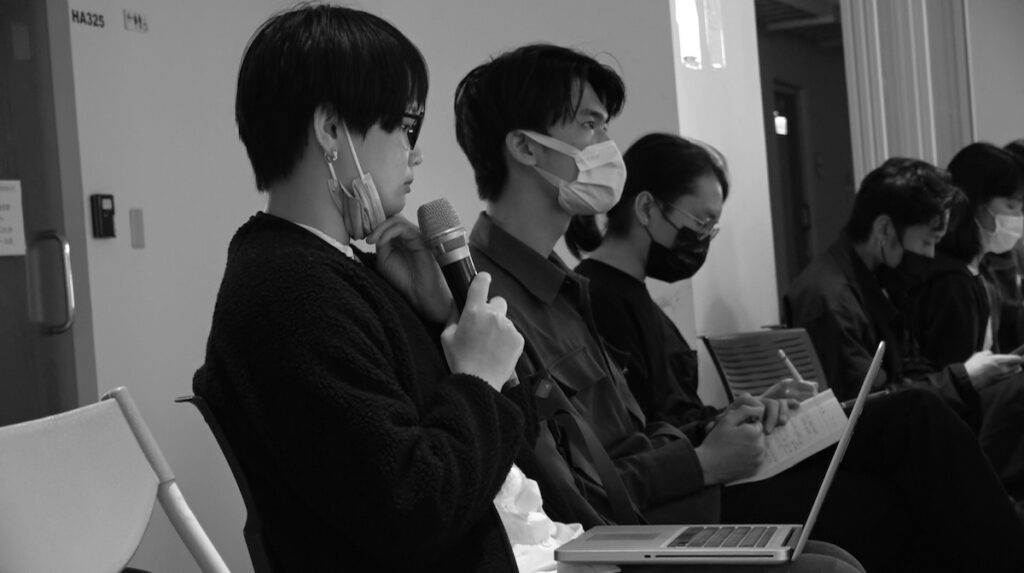
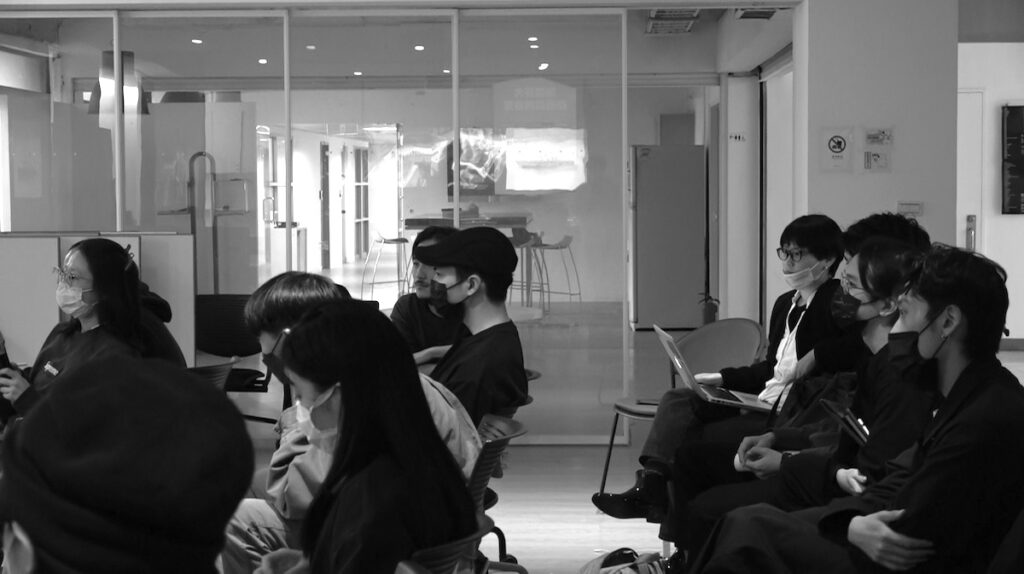
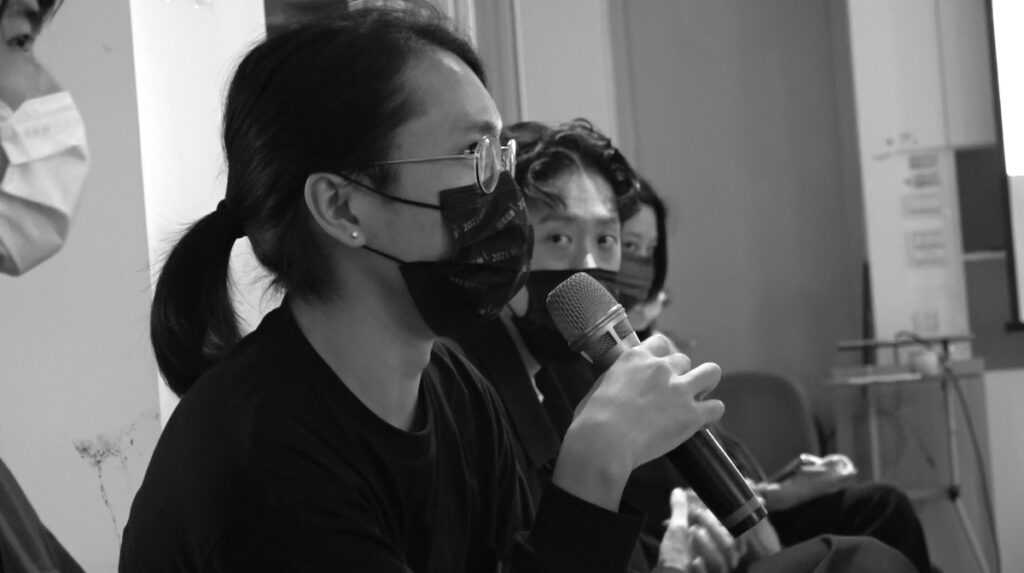
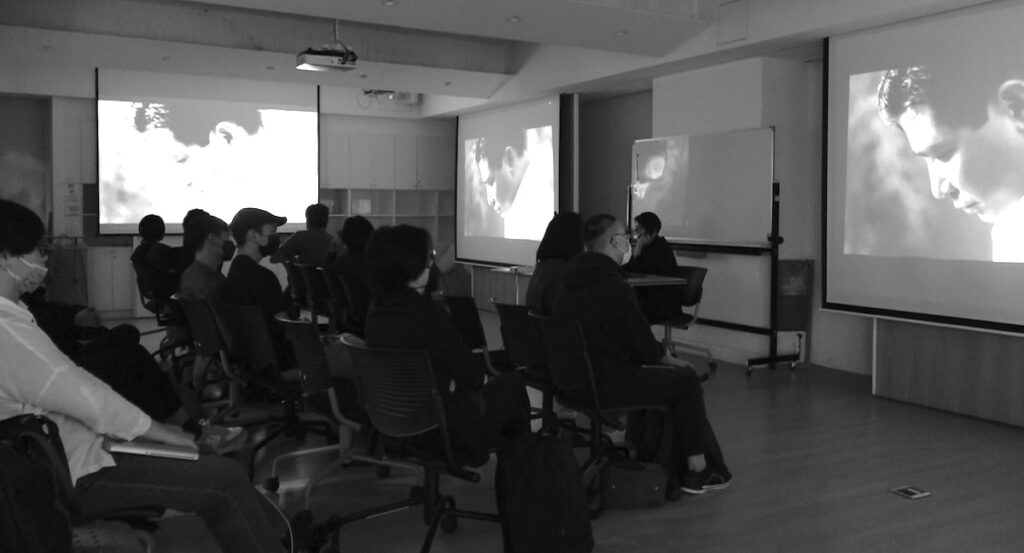
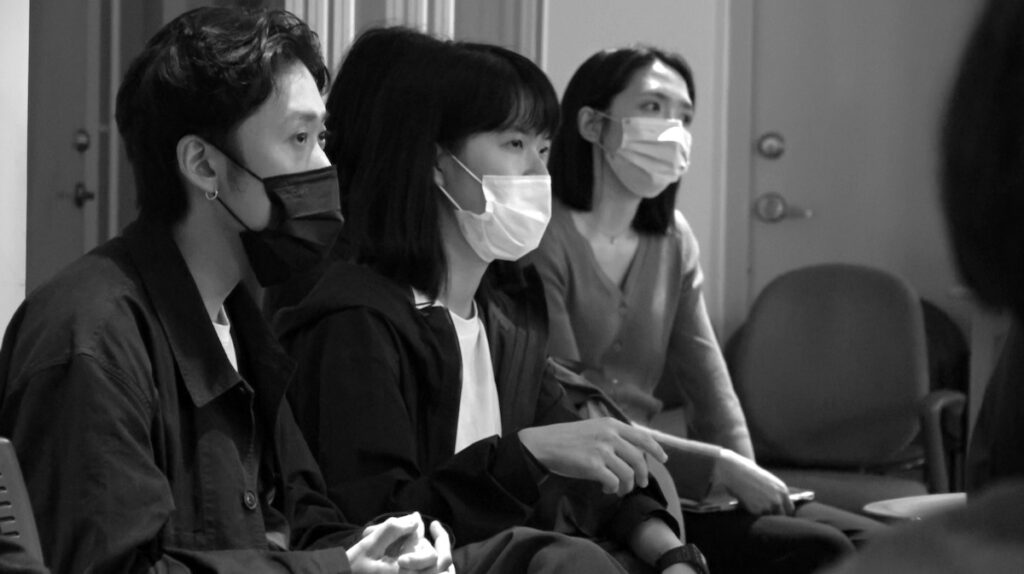
活動側記
十一月一日下午,由陽明交大應藝所林欣怡副教授主持的「超剪:語言之後」影研會在人社一館三樓舉行。本次放映座談延續了「軟電影:超級剪接與資料庫美學」課程中對於資料庫電影的探討,圍繞於標靶導演阮純詩(Nguyễn Trinh Thi)的兩部作品:《Everyday’s the Seventies 》(2018, 15min)、《Eleven Men》(2016, 28min)展開討論。
在《Everyday’s the Seventies 》中,阮純詩透過調度既存的影像資料庫,在主流歷史的大敘事外將個人採訪、媒體與電影以超級剪接(supercut)的形式重新結構為另一種歷史的聲音;《Eleven Men》中則聚焦於越南演員阮如瓊(Nhu Quynh)在1966至2000年所出演的八部電影,透過將卡夫卡(Franz Kafka)的小說《十一個兒子》(Eleven Sons,1919)改編為畫外音,阮純詩藉由對電影中跨越數十年出現的「同一個女人」的影像剪接,虛構出一個女人對於她的十一個男人的描述,給予這個無名的形象一個陳述自己的機會。
延續影研會一貫的問題意識,當資料庫開始作為一種影像的方法,則我們可以如何透過此種影像思考?在阮純詩的作品中,我們可以觀察到一種透過影像去思考歷史的嘗試,以及超級剪接此種技術如何重新結構出觀看影像的視線。關於此次放映,林欣怡老師提出將傅柯的觀點平行於此次討論,作為一種觀看的方法。她提及在《傅柯看電影》(Foucault at the movies,2018)書中〈引言:米歇爾.傅柯的剪輯〉(Introduction: Michel Foucault’s Cut)章節的段落:「哲學活動不滿足於將藝術實踐看作對象,而是要在它身上發現哲學自身的問題,所以這兩者在蒙太奇或剪輯(short cut)中獲得重生。」(Maniglier, Patrice and Zabunyan, Dork, 2018: x)對傅柯而言,哲學與藝術的關係並非階級的,而屬平行對視,因此,影像或藝術應當是在觀看、觸摸的同時意識到某種問題意識,而非透過理論論述切割成為對象。影像往往容易成為依附於文字、語言、敘事等物的次要角色,而電影哲學則成為一種時尚熱潮。
然而,這些透過哲學系統的介入來給出觀看方法的言說,已經將觀看電影及思考電影的可能框限,同時也忽視了電影自身的表現。哲學與電影應當被視為兩種面對同一問題意識的表達路徑,從中去發現一種影像與哲學的競合(而非競爭)關係,這便是某種「它種的思考」(thinking otherwise),並透過它種的思考尋找書寫歷史的另外一種方式——並非服從於某種敘事規則,而是以此去介入尚未編碼、尚未被重新架構的事件。如果需要一種「說」的方式,則它並非是要講述某段歷史,而是盡量以不同方式呈現,對傅柯而言,電影則具有捕捉這種微觀歷史的可能性。
Professor Lin said she was aware of six movies included in Eleven Men, which obviously have jurisdiction or command of specific ideology. However, these clips had been resequenced and fragmented into adaptations from literary works —— when viewers try to approach these structure doesn’t need to interpreting, just sprawling, they could aware there is an charismatic unknown object without a trace, by supercut, it could sending an object without revealing it in the authorities structure of the expression structure, in case it token muted in History. At the end of the workshop, Professor Lin said: “Supercut: after language, to me, is to let those bodiless history as an actual moving image event. Becoming an event, not history itself, although it eventually might transform into history. Let them access languages, and after all of it, become the other thought that could resize and reformat our identification .”
回到放映的作品,林老師舉例在《Eleven Men》中至少有六部電影與戰爭相關,明顯地隸屬於某種意識型態下生產的影像,然而它們卻在這部電影中被重新排序、碎片化,並且透過一個文學的改編文本來陳述——這些結構無需過度的詮釋,僅僅將其攤開,我們便可以意識到這之中有某個對象是看似可追溯、實則不能的,這便是超剪的魅力,它可以將對象隱身於作者建構的言說方式中,卻拒絕從屬於某種典範,避免進入被言說後再次沉默的歷史。林老師最後提到:「〈超剪:語言之後〉這個論題對我而言便是讓這些沒有實體的歷史成為一個影像事件。成為事件,而非成為歷史本身,即便它最終很有可能成為歷史。讓它們進入語言,並且在語言之後成為另一種思考,以便讓我們重新衡量自身身份的尺寸和規格。」
Wen-chun had noticed the rewind editing in Eleven Men. The rewind editing of Supercut gave a hint to the audience, moving image was out of speed, it turns out the genre of moving image looks like a document rather than cinema. That path leads the viewers to open various affection to approaching cinematic objects, although this path causes misunderstanding. And the intertextuality in Everyday’s the Seventies is interwoven with archives, fiction films, documentaries, frame and component voice over to experiment construction of possibilities of vision. Wen-chun continued to explain, at the end of another essay film Loin du Viêtnam(1967) gave a statement about impossible backtrack: “In a few minutes, this film will end. You’ll leave this room, and most of you will go back to a peaceful world. It’s also ours, and we know how easy it is to forget certain realities. We are far from Vietnam. The Vietnam of our feelings is sometimes just as far from Vietnam as in difference would be. We live in a society which excels in hiding its own goals, its only virtues, and its own violence. This war isn’t a historical accident. Nor an unresolved colonial problem. It’s here. Around us. Inside us.” When movie end, audience will away from somewhere they ever and never could been, also was impossible to return by same mean. But an adaptation as expression could approach the imagination to sieve through rewind and replay, that is possible to shake metaphors of language of cinema.
放映結束後,分別由碩士生林玟君、柯祖皓及沈昕皜以個別的角度切入超剪、資料庫電影與此次放映作品的討論。林玟君在回應中提到,在《Eleven Men》中出現片段的回放(rewind)提供了觀眾得知影像並非以正常速度播放的線索,這使得影像看起來像是檔案而非電影,這樣的操作使得觀眾在面對影像時會開啟不同的情緒反應,甚至錯認影像主體的情緒。而在《Everyday’s the Seventies》中交織互文的影像檔案則透過檔案、電影與紀錄片的畫面、畫外音配置,實驗一種視覺建構的可能,玟君舉例論文電影《遠離越南》(Loin du Viêtnam,1967)中的一段敘述:「在幾分鐘內,這部電影將會結束。你們會離開這個房間,大部分的你們會回到和平的世界。這也是我們,我們知道忘記當前的現實是多麼容易。我們離越南太遙遠。
我們對越南的感受差異其實有如我們有著和越南不同的距離。我們生活在一個高度精密隱藏它自身目標、專斷地美德以及它自身暴力的社會。這場戰爭不是歷史的意外。也不是一個待解決的殖民問題。它就在這裡。圍繞著我們。在我們裡面。」觀眾看完一部電影,隨即遠離未曾抵達過的他方。同樣地,透過電影重返現場是不可能的,但是可以利用誰說過的話接近那個想像,並且藉著倒帶再播放去抖露、搖動電影語言的寓意。
沈昕皜則透過對《Eleven Men》的製作場景想像,從觀看資料庫電影的身體出發思考,資料庫電影給出了什麼不同的感知經驗,以及如何給出一種新的觀看。透過電腦與檔案互動、編輯建構影像場景的工作模式,我們可以想像拼貼影音資料時的某種姿勢,生產環境同時也展示了媒介的外觀結構。相較於傳統電影所給出感覺形式上的混合,資料庫所呈現的清單列表與電影的時間軸混合,視覺、聽覺的資料拼貼,則重新敞開了觀者對於形體以及結構的觀看與感受。
柯祖皓的回應則試圖聚焦出一種面對資料庫電影——立方體影像——的觀看視線:當影像透過調度形成影像資料庫,則在這樣巨集的影像量體中,視線或許是停滯不動,或等待被影像召喚的;同樣地,在這樣密集且複雜的影像集合中也並不存在理想的觀眾。這形成了一種影像的回視,而觀眾也將透過這種回視,在觀看資料庫電影的同時反覆確認身為觀眾的位置所在。而以身在一個從一開始就需要選擇影像(或者,被影像選擇)的時代,如何在這樣巨大而且多層的資料庫中確認自己在哪裡?如何透過這樣的遭逢確認而非破碎自己?或許只有帶著這樣的觀看意識,才能以眾多龐雜的影像作為定位點,進而透過觀看去建立個人與影像間的私人系譜,從而在被無數影像覆蓋的此刻,尋得一條回到自身的路徑。
// 主辦單位:國立陽明交通大學感官實驗室
// 協辦單位:國立陽明交通大學文化研究國際中心.教育部高等教育深耕計畫.科技部
